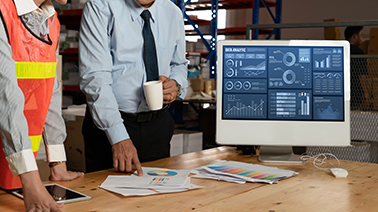Managing a construction company is a difficult task. It can be very difficult to manage finances, projects, and resources, as well as to keep track of paperwork. It may be time to consider implementing construction ERP (Enterprise Resource Planning) software if you're struggling to maintain efficiency and organization. Here are some indicators that using this effective tool could be beneficial for your construction company:
1. Having Trouble Managing Projects:
Do you frequently find that your projects are over budget or delayed? ERP software can help in keeping track of deadlines, resources, and timelines. It provides resources for organizing, scheduling, and tracking projects, guaranteeing that everything is completed on time and on budget.
2. Unstructured Information and Records:
Is your computer overflowing with files and your desk covered in mountains of paperwork? ERP software makes it simple to locate the information you need when you need it by centralizing all of your data and documents in one location. Eliminate the need to search through numerous folders or rummage through piles of paper.
3. Ineffective Interaction:
Are teams, contractors, and clients not communicating with each other clearly? Errors and delays can result from inadequate communication. ERP software offers a centralized information sharing platform that lowers the possibility of misunderstandings and guarantees that everyone is in agreement.
4. Inaccurate Monitoring of Finances:
Is it hard for you to remember what you've spent, who sent what, and when? Mismanagement of your finances can reduce your profitability. All financial processes are integrated by ERP software, which gives you real-time financial visibility and aids in managing budgets, keeping track of expenses, and producing accurate reports.
5. Having Trouble Managing Resources:
Is it difficult to maintain track of your labor, supplies, and equipment? Time and money can be lost as a result of resource mismanagement. ERP software makes resource allocation and tracking more effective, preventing expensive delays and guaranteeing that you have what you need when you need it.
6. Compliance Pains:
Do you find yourself worrying about complying with regulations and upholding compliance all the time? There are strict regulations governing the construction industry, and noncompliance can lead to penalties and legal problems. ERP software ensures you stay on top of regulatory requirements by managing compliance by keeping thorough records and producing required reports.
7. Absence of Real-Time Data:
Do you wish you had more insight into how your company is run? Without real-time data, decisions can be made at great risk. ERP software gives you instantaneous insights into all facets of your company, including project status and financial health, empowering you to take well-informed decisions and promptly resolve any problems.
8. Growth Obstacles:
Are your present systems failing to keep up with the growth of your business? Taking on more projects and managing different teams and locations gets harder as your construction company grows. ERP software offers the capabilities you need to handle growing complexity without compromising productivity because it is scalable and can expand with your company.
9. Often Making Mistakes and Errors:
Are you seeing more and more mistakes and errors in your projects? These errors can be expensive, whether they are related to billing, missed deadlines, or incorrect orders. Numerous repetitive tasks are automated by ERP software, which lowers the possibility of human error and increases accuracy overall.
10. Unsatisfactory Customer Experience:
Are your clients dissatisfied because of poor work, misunderstandings, or delays? Customer satisfaction is essential to the success and reputation of your company. ERP software facilitates communication, expedites processes, and guarantees the completion of projects of a high caliber, which results in satisfied customers and increased recurring business.
Understanding construction ERP software:
For construction companies, construction ERP software is like having a powerful tool. It enables them to handle all of their financial processes, projects, and resources in one location. It makes everything easier to organize and keep track of by grouping tasks like handling materials, managing budgets, scheduling work, and planning projects. This software facilitates communication, saves time, and aids in decision-making for businesses. It is specifically designed for construction, ensuring that projects are completed on schedule, on budget, and with the highest possible quality.
Key Considerations for Implementing Construction ERP Software:
Using construction ERP software can revolutionize your company by enabling you to handle finances, resources, and projects more skillfully. But selecting and putting into place the best ERP system calls for significant thought and preparation. To guarantee a successful implementation, consider the following important factors:
1. Recognize Your Needs:
Evaluate your business needs from a distance before looking at various ERP systems. What particular issues are you attempting to resolve? Do you have trouble allocating resources, managing finances, or managing projects? Selecting a system with the appropriate features for your company will be made easier if you are aware of your needs.
2. Selecting the Proper Supplier:
ERP suppliers differ from one another. Seek out a supplier with a solid track record and experience in the construction sector. Examine reviews, get references, and see if they provide the assistance you require before, during, and after implementation.
3. Spend Less and Make Better Choices:
It's crucial to carefully consider your budget because ERP systems can be costly. Take into account not just the software's initial purchase price, but also recurring expenses for things like upkeep, upgrades, and training. When you decide, make sure you are fully aware of all the associated costs.
4. Assure Scalability:
Even though your company is small right now, how will it be in five or ten years? Select an ERP system that expands with your company. Scalability guarantees that as your business grows, the system can accommodate more projects and heavier workloads.
5. Put Integration First:
There should be no issues integrating your ERP system with your current tools and software. Verify whether the ERP system can interface with the project management programs, accounting software, and other systems you currently use. Integration guarantees efficient workflows and helps prevent data silos.
6. Interface That's Easy to Use:
From project managers to accountants, everyone in your company should be able to use the ERP system with ease. Employee adoption rates rise when an interface is easy to use, lowering the learning curve. Before deciding, request a demo to check out the system's ease of use.
7. Personalization Choices:
Since every construction company is different, you might require an ERP system that can be customized to match your particular workflows and processes. Verify whether the ERP software can be customized to meet your needs as a business.
8. Instruction and Assistance:
For your team, putting in place a new ERP system may mean significant changes. Make sure the vendor offers thorough training to assist in bringing your staff up to speed. Furthermore, in order to resolve any problems that may arise both during and after the implementation, dependable customer support is essential.
9. Information Security:
Data security is crucial because your ERP system will store a lot of sensitive information. Make sure the system has strong security safeguards in place to ward off cyberattacks, including data encryption, secure user access controls, and frequent security updates.
10. Implementation Schedule:
It can take some time to implement an ERP system, so you should budget for it. Talk to the vendor about the implementation schedule and establish reasonable goals. Before you completely switch over to the new system, make sure you allow enough time for testing and training.
11. Assess Analytics and Reporting:
The capacity of ERP software to produce in-depth reports and analytics is one of its main advantages. Make sure the system has strong reporting features so you can get a better understanding of your company's financial situation, project performance, and business operations. Using a data-driven approach, you can make wise decisions.
12. Obtain Employee Support:
Getting employee buy-in is crucial because it will be your staff who use the ERP system on a daily basis. Engage them in the process of selection, solicit their opinions, and attend to their concerns. A system that satisfies their requirements and is user-friendly will be more successful and have greater adoption rates.
In summary:
Your company's operations can be greatly enhanced by the use of Construction ERP software, but careful system selection and implementation planning are crucial. You can position your construction company for success by taking into account your needs, selecting a reliable vendor, making sensible financial decisions, and guaranteeing security and user-friendliness. Recall that the objective is to identify a system that not only satisfies your present requirements but also fosters your development and improves your project management skills.






